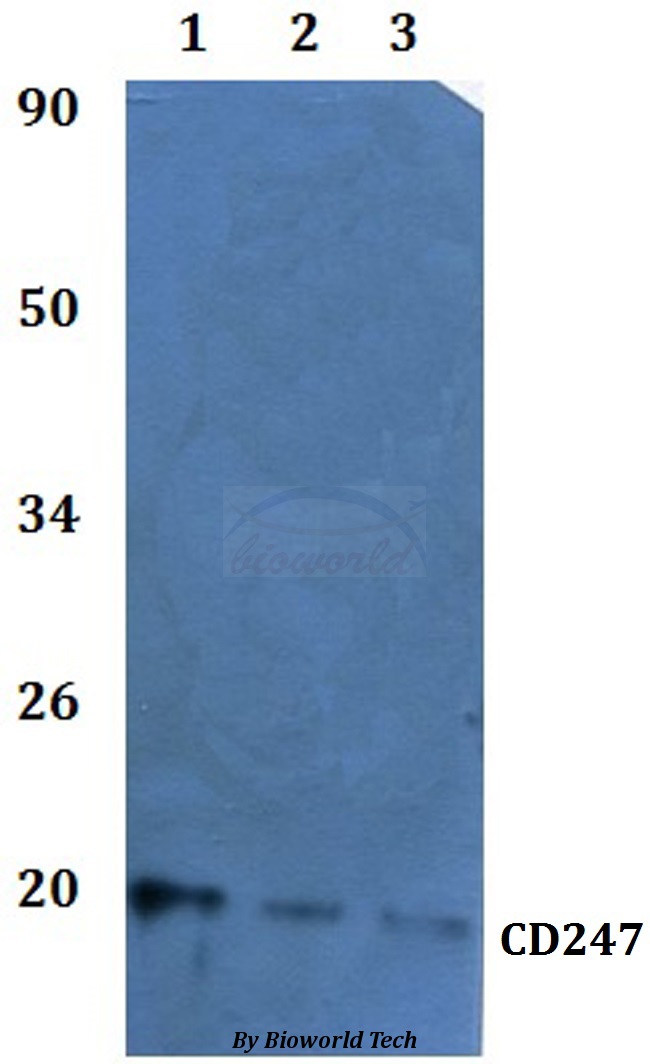![WB analysis of phosphorylated particular human CD3 zeta mutants using GTX00521 CD3 zeta (phospho Tyr72) antibody [EM-26] and CD3 zeta (phosphoTyr153) [EM-17]. The Y1F and Y6F mutatants lack phosphotyrosine 72 and 153, respectively. WB analysis of phosphorylated particular human CD3 zeta mutants using GTX00521 CD3 zeta (phospho Tyr72) antibody [EM-26] and CD3 zeta (phosphoTyr153) [EM-17]. The Y1F and Y6F mutatants lack phosphotyrosine 72 and 153, respectively.](https://www.genetex.com/upload/website/prouct_img/normal/GTX00521/GTX00521_20191025_AP_001_59_w_23053121_501.webp)
WB analysis of phosphorylated particular human CD3 zeta mutants using GTX00521 CD3 zeta (phospho Tyr72) antibody [EM-26] and CD3 zeta (phosphoTyr153) [EM-17]. The Y1F and Y6F mutatants lack phosphotyrosine 72 and 153, respectively.
CD3 zeta (phospho Tyr72) antibody [EM-26]
GTX00521
ApplicationsFlow Cytometry, ImmunoFluorescence, Western Blot, ImmunoCytoChemistry
Product group Antibodies
ReactivityHuman, Mouse
TargetCD247
Overview
- SupplierGeneTex
- Product NameCD3 zeta (phospho Tyr72) antibody [EM-26]
- Delivery Days Customer9
- ApplicationsFlow Cytometry, ImmunoFluorescence, Western Blot, ImmunoCytoChemistry
- CertificationResearch Use Only
- ClonalityMonoclonal
- Clone IDEM-26
- Concentration1 mg/ml
- ConjugateUnconjugated
- Gene ID919
- Target nameCD247
- Target descriptionCD247 molecule
- Target synonymsCD3-ZETA, CD3H, CD3Q, CD3Z, CD3ZETA, IMD25, T3Z, TCRZ, T-cell surface glycoprotein CD3 zeta chain, CD247 antigen, zeta subunit, CD3Z antigen, zeta polypeptide (TiT3 complex), CD3zeta chain, T-cell antigen receptor complex, zeta subunit of CD3, T-cell receptor T3 zeta chain, TCR zeta chain, tissue factor-targeting CAR1 dimer, tissue factor-targeting CAR1 monomer
- HostMouse
- IsotypeIgG2b
- Protein IDP20963
- Protein NameT-cell surface glycoprotein CD3 zeta chain
- Scientific DescriptionThe protein encoded by this gene is T-cell receptor zeta, which together with T-cell receptor alpha/beta and gamma/delta heterodimers, and with CD3-gamma, -delta and -epsilon, forms the T-cell receptor-CD3 complex. The zeta chain plays an important role in coupling antigen recognition to several intracellular signal-transduction pathways. Low expression of the antigen results in impaired immune response. Two alternatively spliced transcript variants encoding distinct isoforms have been found for this gene. [provided by RefSeq, Jul 2008]
- ReactivityHuman, Mouse
- Storage Instruction2°C to 8°C
- UNSPSC12352203

![ICC/IF analysis of immunological synapse formed between the lymph node naive T cells (from AND TCR transgenic mice) and DCEK cells loaded with MCC peptide using GTX00521 CD3 zeta (phospho Tyr72) antibody [EM-26]. Green : total CD3 zeta Blue : GTX00521 Red : Actin ICC/IF analysis of immunological synapse formed between the lymph node naive T cells (from AND TCR transgenic mice) and DCEK cells loaded with MCC peptide using GTX00521 CD3 zeta (phospho Tyr72) antibody [EM-26]. Green : total CD3 zeta Blue : GTX00521 Red : Actin](https://www.genetex.com/upload/website/prouct_img/normal/GTX00521/GTX00521_20191025_AP_002_58_w_23053121_329.webp)





![FACS analysis of Jurkat cells using GTX83004 CD3 zeta antibody [4B10]. Green : CD3 zeta Purple : negative control](https://www.genetex.com/upload/website/prouct_img/normal/GTX83004/GTX83004_20170912_FACS_w_23061322_502.webp)
![FACS analysis of human peripheral blood cells using GTX83391 CD3 antibody [4D10A6].](https://www.genetex.com/upload/website/prouct_img/normal/GTX83391/GTX83391_20170912_FACS_w_23061322_719.webp)